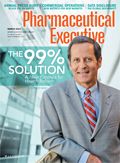The Community Ethic
Pharmaceutical Executive
Regardless of how you define it, partnership is also an institutional necessity as big Pharma adjusts to disruptive changes in the way health services are financed and delivered. A revolution in the making, where legislation combined with market forces as well as community and stakeholder advocacy are adding fresh momentum to a population-based approach to health practice. Population health focuses on a system built around three pillars of care: preventive care, primary care, and coordinated care, all driven by a single performance metric, which is value, as evidenced through quality and outcomes. Executing around this integrative model depends entirely on partnerships, especially with non-traditional players like the physician assistant.
THE WORD THAT SITS HIGHEST in the vocabulary of big Pharma today is partnership. Like most fuzzy terms of endearment, the word can be interpreted in two ways. Is partnership an expression of the confidence that comes from an excess of opportunity, or is it a sign of vulnerability, when all those big investments in messaging, money and manpower no longer guarantee a company can succeed on its own? The answer is that the urge to partner is driven by both instincts, which is ultimately good for innovation: opportunity – and greed – leavened by vulnerability – and risk – are accurate reflections of the human condition and thus tend to produce medicines that matter to the patient.

William Looney
Regardless of how you define it, partnership is also an institutional necessity as big Pharma adjusts to disruptive changes in the way health services are financed and delivered. Our cover feature this month, on Thomas Jefferson University Dean Dr. David Nash, is a portrait of a revolution in the making, where legislation combined with market forces as well as community and stakeholder advocacy are adding fresh momentum to a population-based approach to health practice. Population health focuses on a system built around three pillars of care: preventive care, primary care, and coordinated care, all driven by a single performance metric, which is value, as evidenced through quality and outcomes. Executing around this integrative model depends entirely on partnerships, especially with non-traditional players like the physician assistant. The mantra around population health is simple and explicit: No outcomes means no income. And where there is no community, there is less health.
Pharm Exec has its own network of partnerships based on the premise that good, independently sourced information is a "force multiplier," with the potential to turn the inchoate idea into actions that, when applied in diverse settings, actually make a difference – to real people. Our chosen vehicle for that dynamic community is the Pharm Exec Editorial Advisory Board, 32 experts representing numerous geographies – from Russia to Canada to the US, India and France – and drawn from nearly all segments of the health enterprise. I choose that latter phrase carefully, as our industry today is all about positioning away from the pill sell. It's the prudent survival mode in markets where value is founded on versatility.
Our most recent meeting, on January 30, was a deliberate effort to engage an often neglected stakeholder, the academic community: in this case the Erivan Haub School of Business at St. Joseph's University in Philadelphia, which co-hosted the day long discussion. Among other topics, we explored new competition-killing approaches to securing a dominant therapeutic franchise; the next iteration of a two-decade long series of academic studies tracing the average cost of developing an NCE; the growth of "impact investing" among groups with an agenda beyond a simple ROI; and the soft underbelly of emerging country markets, which is the way that inadequate health financing and spotty care infrastructure perpetuates larger business challenges linked to poor governance.
But the highlight was a group exchange between the EAB and four St. Joseph Business School alumni, focused on one theme: the future. One takeaway was the niche role that companies tend to impose on employees, particularly as the former get larger and the latter gain traction. Careers are becoming like commodities – good for one function, with too many people doing it. What big Pharma really needs in the years ahead is versatility, curiosity and transferable skills. In other words, the question of how well you understand your community may be more important to success than work ethic. And we hope that Pharm Exec will help provide that window on the wider world.

William Looney Editor-in-Chief wlooney@advanstar.com Follow Bill on Twitter: @BillPharmExec
Addressing Disparities in Psoriasis Trials: Takeda's Strategies for Inclusivity in Clinical Research
April 14th 2025LaShell Robinson, Head of Global Feasibility and Trial Equity at Takeda, speaks about the company's strategies to engage patients in underrepresented populations in its phase III psoriasis trials.
Beyond the Prescription: Pharma's Role in Digital Health Conversations
April 1st 2025Join us for an insightful conversation with Jennifer Harakal, Head of Regulatory Affairs at Canopy Life Sciences, as we unpack the evolving intersection of social media and healthcare decisions. Discover how pharmaceutical companies can navigate regulatory challenges while meaningfully engaging with consumers in digital spaces. Jennifer shares expert strategies for responsible marketing, working with influencers, and creating educational content that bridges the gap between patients and healthcare providers. A must-listen for pharma marketers looking to build trust and compliance in today's social media landscape.
